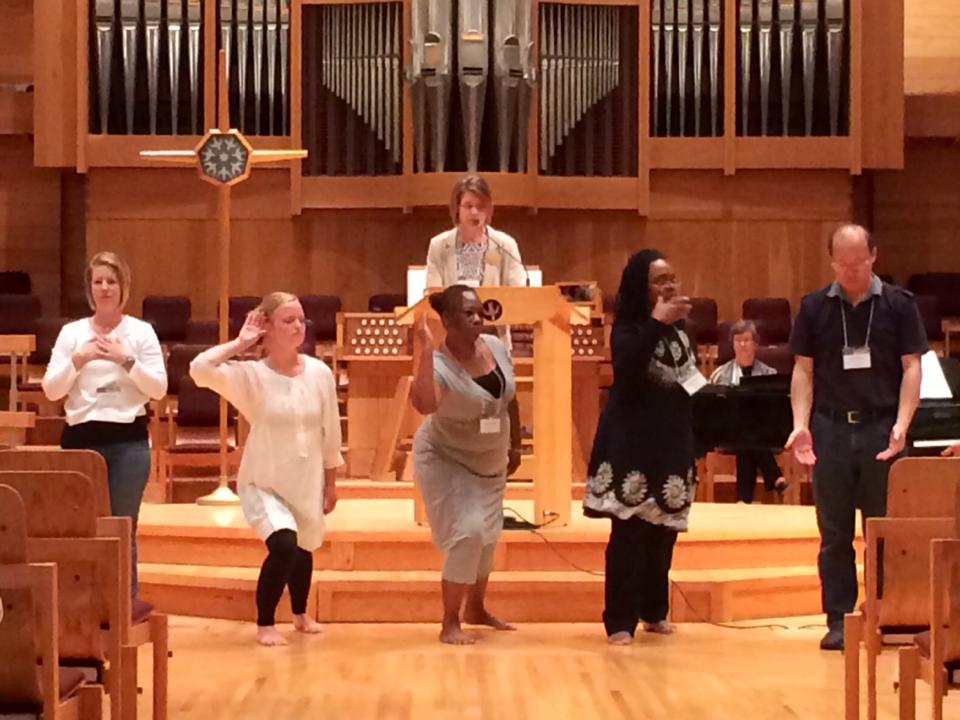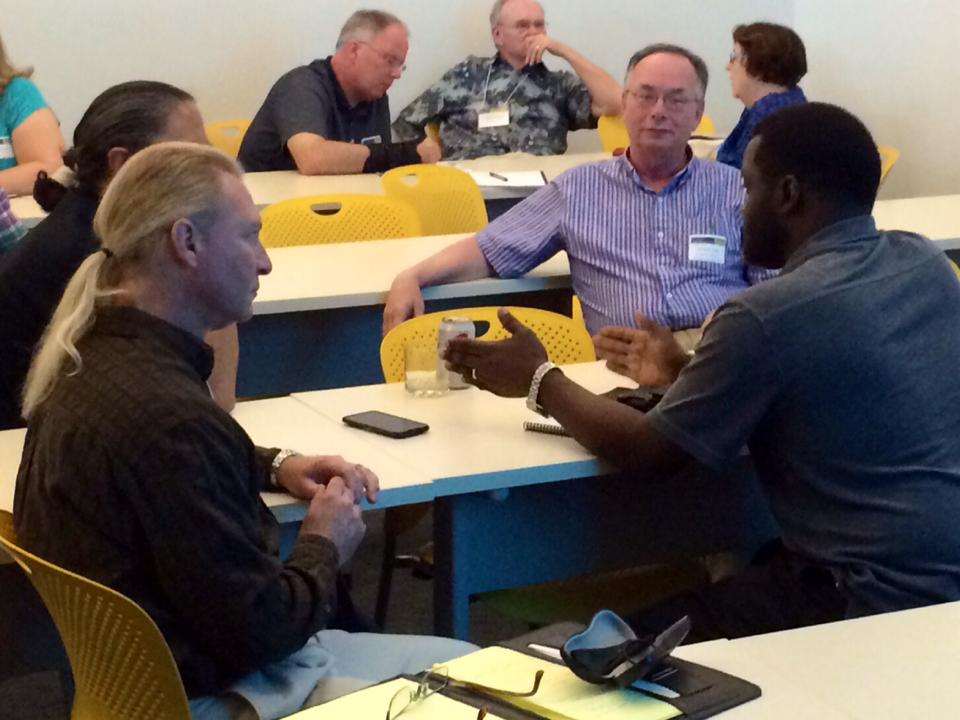Vital Worship Grants Colloquium Wraps
The 2014 Vital Worship Grants Colloquium was infused with the Holy Spirit and horticulture as more than 100 grant recipients from across the continent made their way to Grand Rapids for three days of conversation and education.
Coming as it did this year on the heels of Pentecost, the 2014 Vital Worship Grants Program Colloquium had a definite Holy Spirit vibe.
It permeated the event's plenary sessions, it infused the worship services, it made its way into the workshops and seminars that were part of the Day of Learning on June 10, and it was a key visual element in the program book that attendees carried with them throughout the three days.
The event also had an earthy, organic flavor. There was talk throughout of seeds and planting and fertilizer and new growth, but also conversations around harvesting and pruning and sometimes even digging up and starting anew.
Green and full of sap in the Holy Spirit
The two themes -- the Holy Spirit and horticulture, as Vital Worship program director Kathy Smith said -- came together in both formal and informal conversations throughout the June 9-11, 2014 gathering. On the second day of the event Worship Institute director John Witliet put it this way, referring to Psalm 92: "In the Holy Spirit we are green and full of sap."
On the second day of the event Worship Institute director John Witliet put it this way, referring to Psalm 92: "In the Holy Spirit we are green and full of sap."
The next day, at the third and final worship service of the event, Vital Worship board member Doug Brouwer, a pastor at International Protestant Church in Zurich, Switzerland, picked up on that growth theme in a meditation on Ephesians 4 where Paul writes of the growth that is available to those who live in love and keep the unity of the Spirit.
"In these words is the expectation," he said, "that we will grow." He added: "One thing you can never say about Paul is that he sets the bar too low!"
Setting the bar high for grant recipients
Nor was the bar set low for the more than 100 grant recipients from 2013 (those concluding their grant year) and 2014 (those just just beginning their grant year).
By the third day participants were brimming over with ideas, reflections, new friendships and more. The event began on Monday evening with a plenary panel featuring a quintet of 2013 grant recipients reflecting on their just-completed projects.
 By the time the colloquium concluded on Wednesday at noon attendees had attended three plenaries, three worship services, two sessions just for grant recipients, two workshops as part of the Tuesday Day of Learning event (which was also open to the public), a poster session, two dinners and two lunches, all of which featured numerous opportunities for prayer, reflection and conversation.
By the time the colloquium concluded on Wednesday at noon attendees had attended three plenaries, three worship services, two sessions just for grant recipients, two workshops as part of the Tuesday Day of Learning event (which was also open to the public), a poster session, two dinners and two lunches, all of which featured numerous opportunities for prayer, reflection and conversation.
The pace was quick, but intentionally so, said Smith.
“The synergy at this event between old and new grant recipients is exciting,” said Smith, “and very important because so much learning happens through conversations over meals, while viewing posters produced by the concluding grant projects and in many other venues both informal and formal. We pack a lot into three days, but, we think, for good reasons for both recipients finishing up their projects and for those just beginning.”
Learning from each other
Indeed one critical goal for the annual event is to encourage new grant recipients as their year begins by giving them a chance to learn from not just Worship Institute staff and other experts, but also to create opportunities for learning from fellow churches, schools, seminaries and more, folks in the trenches who are hard at the work of worship renewal.
And in case attendees had any doubts about the worth of the schedule, page five in the program book made it clear what the expectations were: "Please note that all grant recipients are expected to attend all sessions, including worship and meals which are planned to help you engage in learning from other grant recipients."
Meals, as in past years, were designed for both sustenance and education as Worship Institute staff were assigned to each table for each meal to facilitate questions and create spaces for fruitful conversations.
As Smith noted at the final plenary session on Wednesday: "In a way we have all been at one table this week. We have so much in common and yet we are all quite different. The great variety and the new friends we meet, these are things that we take back to our hometowns and congregations as we get ready to leave here today."
First grants awarded in 2000
This year's attendees at the colloquium are part of a history at Calvin that goes back to 2000 when the Worship Institute gave its first grants in 2000.
Since then the Calvin Institute of Christian Worship has awarded more than 600 grants to churches, schools and seminaries across North America for projects that can generate renewed interest, thoughtfulness and energy for public worship at the local, grass-roots level.
The 2014 list included another 31 projects that received $300,000 in grants with funding provided by Lilly Endowment, Inc.
At the 2014 event's final session, Witvliet noted that when the Vital Worship Grants Program began in 2000 one of the foundations for planning the program was 2 Corinthians 9.
He read from that chapter, beginning at verse 8, where Paul writes: "And God is able to bless you abundantly, so that in all things at all times, having all that you need, you will abound in every good work. As it is written: 'They have freely scattered their gifts to the poor; their righteousness endures forever.' Now he who supplies seed to the sower and bread for food will also supply and increase your store of seed and will enlarge the harvest of your righteousness. You will be enriched in every way so that you can be generous on every occasion, and through us your generosity will result in thanksgiving to God. This service that you perform is not only supplying the needs of the Lord’s people but is also overflowing in many expressions of thanks to God."
"That word overflow has got to be one of the best words in all of Paul," Witvliet added with a big smile. It also was an apt description for the 2014 colloquium: overflowing with generosity and thanks.
-written by senior public relations specialist Phil de Haan